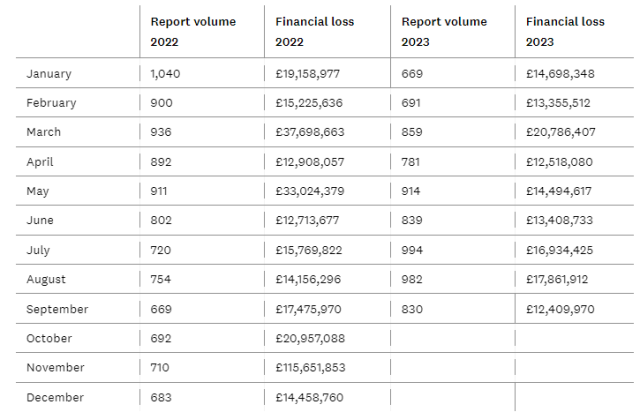UK Crypto Scams Surge by 23%, Lloyds Bank Warns
Lloyds Bank has issued a stark warning as crypto scams spike by 23% this year, revealing that victims are losing an average of £10,741. The report highlights the alarming trend of two-thirds of these scams originating on social media platforms.
The data underscores the urgent need for increased awareness and regulatory measures in the cryptocurrency space, where the promise of profit intersects with the growing threat of deception, posing a significant challenge for investors navigating this evolving financial landscape.
Crypto Scams: Young Individuals On The Crosshair
Lloyds has revealed that individuals falling within the 25 to 34 age bracket constitute the most common demographic targeted by crypto scams.
According to the bank, prospective crypto investors typically find themselves making an average of three payments before realizing they have fallen prey to scams.
Alarmingly, it takes approximately 100 days from the initial transaction for victims to report the fraudulent activity to their bank, shedding light on the persistence and sophistication of these deceptive schemes.
Total crypto market cap at $1.37 trillion on the daily chart: TradingView.com
An analysis highlights that 66% of investment scams initiate on social media, primarily through Instagram and Facebook. These scams involve fake ads, celebrity endorsements, and targeted messages. Investors are advised to verify the legitimacy of opportunities to avoid falling prey to these deceptive tactics.
A separate report obtained data from City of London Police, revealing 9,709 reports of cryptocurrency scams and a £329,199,179 loss in 2022. In 2023, 7,559 reports resulted in a £136,468,004 loss. These figures likely underestimate the problem, as Action Fraud relies on self-reporting, and Police Scotland’s data is excluded.
Source: City of London Police
Liz Ziegler, the director of fraud prevention at Lloyds Bank, emphasized that cryptocurrency is a “notably high-risk asset category” with limited regulation, making it an “appealing target for fraudsters.”
Many banks in the UK have blocked transactions to bitcoin trading platforms due to the widespread problem of cryptocurrency scams. The most recent bank to inform consumers that they could no longer buy cryptocurrency assets using their Chase debit card or with a bank transfer was Chase by JPMorgan in September.
The Lloyds Bank report, which supports Coinbase’s results, says that younger Americans are more receptive to unorthodox financial options like cryptocurrencies, which leaves them more susceptible to fraud.
This group aggressively looks for new business ventures and views cryptocurrency and other new technology as instruments for upgrading the financial system and reimagining the so-called “American Dream.”
Featured image from NoName_13/Pixabay


 Source: City of London Police
Source: City of London Police

